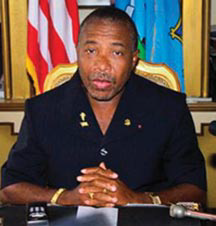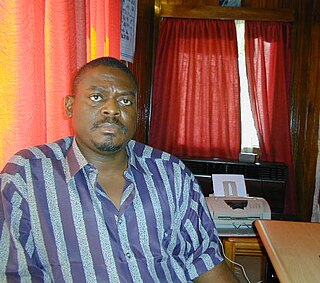Related Research Articles
Universal jurisdiction is a legal principle that allows states or international organizations to prosecute individuals for serious crimes, such as genocide, war crimes, and crimes against humanity, regardless of where the crime was committed and irrespective of the accused's nationality or residence. Rooted in the belief that certain offenses are universally morally reprehensible and that they threaten the international community as a whole, universal jurisdiction holds that such acts are beyond the scope of any single nation's laws. Instead, these crimes are considered to violate norms owed to the global community and fundamental principles of international law, making them prosecutable in any court that invokes this principle.

Charles McArthur Ghankay Taylor is a Liberian former politician and convicted war criminal who served as the 22nd president of Liberia from 2 August 1997 until his resignation on 11 August 2003 as a result of the Second Liberian Civil War and growing international pressure.

Major Johnny Paul Koroma was a Sierra Leonean military officer who was the head of state of Sierra Leone from May 1997 to February 1998.

Julius Maada Wonie Bio is a Sierra Leonean politician and 5th and current president of Sierra Leone since 4 April 2018. He is a retired brigadier in the Sierra Leone Army and was the military head of state of Sierra Leone from 16 January 1996 to 29 March 1996, at only 32 years old in a military junta government known as the National Provisional Ruling Council (NPRC). Bio is the first democratically elected president of Sierra Leone born after Sierra Leone's independence from British colonial rule in 1961. As president Bio has implemented free primary and secondary school education in government schools throughout Sierra Leone and has repealed the death penalty in the country after it was passed Parliament.
Christopher Elnathan Okoro Cole, CMG OBE was a Sierra Leonean politician. He served as Governor-general and President of Sierra Leone for 1 day in 1971. Cole was appointed officer of the Most Excellent Order of the British Empire (OBE) in 1965 for "Public services as minister without portfolio" and inducted as a companion of the Order of St Michael and St George in 1973.

David Michael Crane is an American lawyer who was the Chief Prosecutor of the Special Court for Sierra Leone (SCSL) from April 2002 until July 15, 2005. During his tenure, he indicted, among others, the then-President of Liberia, Charles Taylor. Crane was replaced as chief prosecutor by his deputy Desmond de Silva. On April 26, 2012, the SCSL, sitting in The Hague, convicted Taylor on various charges. Crane served as Professor of Practice at Syracuse University College of Law from 2006 until 2018.

The Special Court for Sierra Leone, or the "Special Court" (SCSL), also called the Sierra Leone Tribunal, was a judicial body set up by the government of Sierra Leone and the United Nations to "prosecute persons who bear the greatest responsibility for serious violations of international humanitarian law and Sierra Leonean law" committed in Sierra Leone after 30 November 1996 and during the Sierra Leone Civil War. The court's working language was English. The court listed offices in Freetown, The Hague, and New York City.

Stephen J. Rapp is an American lawyer, academic and former politician who served as United States ambassador-at-large for war crimes issues in the Office of Global Criminal Justice. He previously served as Member of the Iowa House of Representatives from the 34th district from 1973 to 1975 and from 1979 to 1983.
Emmanuel Olayinka Ayoola was a Nigerian lawyer and judge who became Chairman of the Independent Corrupt Practices Commission in 2005. He was also a judge of the Appeals Chamber of the Special Court for Sierra Leone.
Justice Shireen Avis Fisher is a justice of the Residual Special Court for Sierra Leone, having been appointed to the role in October 2013 following the ad hoc tribunal's dissolution that year and having previously served as an Appeals Judge on the court from 2009 to 2013 and as President from 2012 to 2013. Previous to this appointment, Fisher served as an International Judge of the Court of Bosnia and Herzegovina.

Brenda J. Hollis is an American lawyer. She was appointed by United Nations Secretary-General Ban Ki-moon as Prosecutor of the Special Court for Sierra Leone in February 2010, replacing Stephen Rapp. Hollis was the Chief Prosecutor at the Special Court and served as the lead prosecutor in the trial and appeal of the case against Charles Taylor, the former President of Liberia. Hollis previously served as the Prosecutor of the Residual Special Court for Sierra Leone, which replaced the Special Court in December 2013; currently James Johnson, an adjunct professor at Case Western Reserve University School of Law, serves as the Chief Prosecutor for the Residual Special Court for Sierra Leone. She also serves as the Reserve International Co-Prosecutor for the Extraordinary Chambers in the Courts of Cambodia, and works as a consultant in international criminal law and procedure.

The Supreme Court of Sierra Leone is the highest court in Sierra Leone. It has final jurisdiction in all civil, criminal, and constitutional cases within Sierra Leone, and its decisions cannot be appealed. The Supreme Court has the exclusive constitutional power to overturn ruling of lower courts within the jurisdiction of Sierra Leone. The Supreme Court, along with the Court of Appeals, High Court of Justice, and magistrate courts form the Judicial branch of the Government of Sierra Leone.

United Nations Security Council Resolution 1688, adopted unanimously on June 16, 2006, after recalling all previous resolutions on the situation in Liberia, Sierra Leone and West Africa, including resolutions 1470 (2003), 1508 (2003), 1537 (2004) and 1638 (2005), the Council approved the transfer of former Liberian President Charles Taylor to the Special Court for Sierra Leone which was moved to The Hague in the Netherlands, due to security concerns.
Sylvester E. Rowe is a former Ambassador and Deputy Permanent Representative of Sierra Leone to the United Nations. He joined the Mission in 1997 as an adviser after a distinguished career in the United Nations Secretariat spanning three decades during which he served in several capacities including head of the UN Radio and Television Services; a speech writer and Spokesman for the President of the 39th session of the UN General Assembly (1984–85), and a member of the panel of counsel in the UN administration of justice system – the Joint Appeals Board and the Administrative Tribunal. In 1994 he served as a resource person in Ambassador Brahimi's special mission on behalf of the Secretary-General of the United Nations, to Liberia and the ECOWAS Chair in Ghana, aimed at facilitating implementation of the Cotonou Peace Agreement for Liberia.
Mary Mam Yassin Sey, also known as Mary Mamyassin Sey, was a Gambian judge who previously served as a Justice of the Supreme Court of the Gambia and was also a Judge of the Supreme Court of Vanuatu.

Essa Mbye Faal is a Gambian international lawyer who is a defence counsel at the International Criminal Court (ICC) and a senior partner at Faal and Co. Faal led the prosecution in the Darfur investigations and as a lead defence counsel for a number of other cases. In 2018, he was appointed as chief prosecutor at the Gambian Truth, Reconciliation and Reparations Commission (TRRC).
Alain Werner is a Swiss human rights lawyer, specialized in the defence of victims of armed conflicts, founder and director of Civitas Maxima (CM), an international network of lawyers and investigators based in Geneva that since 2012 represents victims of mass crimes in their attempts to obtain justice.
Events in the year 2012 in Liberia.
References
- ↑ RSCSL: press statement announcing the death
- ↑ Announcement of death: Sierra Loaded
- ↑ "Announcement of death: Makoni Times". Archived from the original on 2016-06-03. Retrieved 2016-05-06.
- 1 2 3 4 "Panels". Harvard University. Archived from the original on 29 June 2011. Retrieved 12 March 2011.
- 1 2 3 Jalloh, Ibrahim. "The Special Court for Sierra Leone: An Update". entre for Accountability and the Rule of Law. Retrieved 12 March 2011.
- ↑ Thomas Escritt (September 26, 2013), Liberia's Charles Taylor loses appeal against war crimes conviction Reuters .